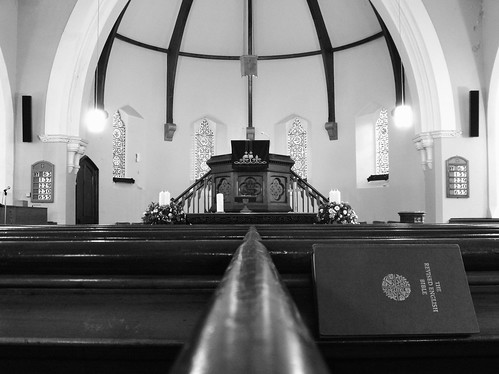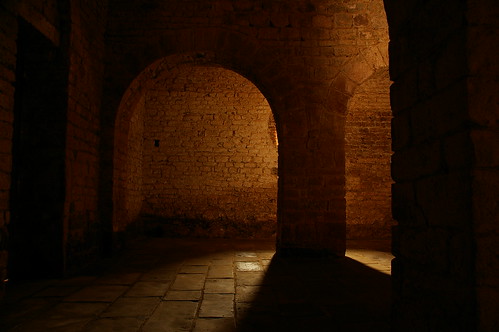Daily reflection and inspiration from the "Prince of Preachers," Charles Haddon Spurgeon.
Thursday, February 28, 2013
You Need Only Be Willing
Willingness to come is everything. A readiness to believe in Jesus, a willingness to cast the soul on him, a preparedness to accept him just as he is, because you feel that he is just the Savior that you need - that is all: there was no other readiness, there could have been none, in the case of those who were poor and blind, and halt, and maimed, yet came to the feast.
The text does not say, “You are ready, therefore come,” that is a legal way of putting the gospel; but it says, “All things are ready, the gospel is ready, therefore you are to come.” As for your readiness, all the readiness that is possibly wanted is a readiness which the Spirit gives us, namely, willingness to come to Jesus.
From a sermon by Charles Haddon Spurgeon entitled "All Things Are Ready. Come." Sermon delivered May 13, 1877. Image by Paulo Brandao on Flickr under Creative Commons License.
Wednesday, February 27, 2013
A Wholly Different Kind Of King
He was no Caesar; you cannot make him appear like one: call him not autocrat, emperor, or czar - he has an authority greater than all these, yet not after their kind. His purple is different from theirs, and his crown also, but his face differs more, and his heart most of all. “My kingdom,” saith he, “is not of this world.” For troops he has a host of sorrows, for pomp a surrounding of scorn, for lofty bearing humility, for adulation mockery, for homage spitting, for glory shame, for a throne a cross. Yet was there never truer king, indeed all kings are but a name, save this King, who is a real ruler in himself and of himself; and not by extraneous force.
Right royal indeed is the Nazarene, but he cannot be likened unto the princes of earth, nor can his kingdom be reckoned with theirs.... Christ’s kingdom shines as a lone star with a brightness all its own. It standeth apart like a hill of light, sacred and sublime: the high hills may leap with envy because of it, but it is not of them nor like unto them. Is not this manifest even in the appearance of our Lord as Pilate brings him forth and cries, “Behold your King!”?
From a sermon by Charles Haddon Spurgeon entitled "Ecce Rex," delivered May 6, 1877. Image by Matteo Paciotti on Flickr under Creative Commons License.
Tuesday, February 26, 2013
Boasting Of Merit, Doubting His Grace
...our nature runs so cross to the whole system of divine grace that we need much assuring before we can believe it. We are always for working, deserving, and earning. Phariseeism is the religion of nature. We boast of our merit and yet we are as meritless as Satan himself. The idea of working and deserving appears to be ingrained in our nature; and as certain as the blood is red, so sure is the heart self-righteous. We cannot divest ourselves of the idea of salvation as payment for work done: that it is a gift, a free gift of grace, it is hard to make us believe. Even after conversion the old tendency betrays itself; we steal away from Jesus to Moses as often as we get opportunity, and then begin to doubt free grace. Therefore the Lord has fettered and bound us down to believing with golden chains of promise and oath. “It must be so,” saith he, “the grace that I have revealed is indeed true, for I have sworn by myself.”
From a sermon by Charles Haddon Spurgeon entitled "Strong Consolation For The Lord's Refugees," delivered April 29, 1877. Image by Matteo Paciotti on Flickr under Creative Commons License.
Monday, February 25, 2013
Here Am I, Send Me!
Brethren, the heathen are perishing, and there is but one way of salvation for them, for there is but one name given under heaven among men whereby they must be saved. God in the glorious unity of his divine nature is calling for messengers who shall proclaim to men the way of life. Out of the thick darkness my ear can hear that sound mysterious and divine, “Whom shall I send?” If ye will but listen with the ear of faith ye may hear it in this house to-day- “Whom shall I send?” While the world lieth under the curse of sin the living God, who willeth not that any should perish but that they should come to repentance, is seeking for heralds to proclaim his mercy; he is asking even in pleading terms for some who will go forth to the dying millions and tell the wondrous story of his love- “Whom shall I send?”
As if to make the voice more powerful by a threefold utterance we hear the sacred Trinity enquire, “Who will go for us?” The Father asks, “Who will go for me and invite my far-off children to return?” The Son enquires, “Who will seek for me my redeemed but wandering sheep?” The Holy Spirit demands, “In whom shall I dwell, and through whom shall I speak that I may convey life to the perishing multitudes?” God in the unity of his nature crieth, “Whom shall I send?” and in the trinity of his persons he asketh, “Who will go for us?” Happy shall we be to-day if earnest responses shall be heard in this house- “Here am I, send me.”
From a sermon by Charles Haddon Spurgeon entitled "The Divine Call For Missionaries," delivered April 22, 1877. Image by Paul Bica on Flickr under Creative Commons License.
Labels:
Christ,
evangelism,
God,
Gospel,
Holy Spirit,
missions,
religion,
salvation,
Spurgeon
Saturday, February 23, 2013
Navigating A Dangerous World
If you are often assailed by foes, and if those foes happen to be the men of your own household, if they jeer at your faith, if they make a jest of holiness on purpose to pain you, you will need a great deal of grace not to be ruffled. To be a dove always, to be a dove in the midst of ravens: to be a lamb always, to be a lamb in the midst of wolves, is not so easy. He must have much spiritual life who shall be able, wisely and discreetly, to behave himself in the midst of those who lie in wait to entrap him in every word that he says. Remember how David acted in the court of Saul, when Saul eyed him. Unsullied purity is the safest policy. Though Saul eyed David he could not see any fault or rake up any charge that he could bring against him.
Oh that all of you young people, especially those of you who are subjected to scorn and contempt because of your fidelity to Christ, may be doubly girt with grace, may you be, indeed, quickened to the full spiritual life, that you may stand the test of persecution and reproach, of suspicion and disparagement, of misrepresentation and slander, which is sure to come upon you. Do not pray to be rid of the grievance: rather rejoice that you are counted worthy to suffer shame for your Savior’s sake.
From a sermon by Charles Haddon Spurgeon entitled "Enlivening And Invigorating." Image by "A Guy Taking Pictures" on Flickr under Creative Commons License.
Labels:
Christ,
Christianity,
David,
holiness,
persecution,
religion,
Spurgeon
Friday, February 22, 2013
Stay Free!
Those who had been of the sect of the Pharisees brought a good share of Pharisaic tendencies with them into the church, and these were dangerous to the young kingdom of Christ. I scarcely know whether legal principles were not able to do more mischief inside the church by perverting pure doctrine than they could do outside the church by exciting persecution. One can hardly imagine how the gospel could have escaped being overlaid and smothered by Judaism, like a babe by its mother, had it not been for the preserving grace of God, and the indwelling Spirit within the church of God.
Ye know, brethren, how we mourn at this day that certain who claim to be Christians are laboring most zealously to put a yoke upon the neck of the disciples which neither our fathers nor we were able to bear. They invent pompous ceremonies, observe days and months, and are bound by rubrics and regulations, all of which are an idle and needless servitude to outward forms. Certain others would bind us with creeds and ordinances not plainly taught in the word of God, nor agreeable thereto, of which Peter and John knew nothing whatever, having no force but that which comes of human authority. The old Pharisaic spirit is a great forger of bonds and builder of prisons, it would subject us to ordinances of “Touch not, taste not, handle not,” and fetter us with rules of many sorts: for it cannot understand the liberty wherewith Christ hath made us free. It teacheth this and it teacheth that, whereof the apostles would have said, “We gave no such commandment.” We must contend against this spirit as much now as ever. Still must we refuse to be entangled again with the yoke of bondage. Christ is all. We are complete in him, and we will not permit a single letter to be added to his perfect law of liberty.
From a sermon by Charles Haddon Spurgeon entitled "Faith Purifying The Heart," delivered April 15, 1877. Image by Steve Dunleavy on Flickr under Creative Commons License.
Thursday, February 21, 2013
Grace Must Change Us
...grace must make us into silver or into golden vessels, or the Master cannot himself use us, nor can our use in the church ever be to honor. The wooden vessels in the church are very easily hacked and carved and spoiled; if a man be inclined to mischief he can put his knife to them and can cut great notches in them, ruin their character, and render them worthless. Cunning teachers can soon take away from merely nominal Christians what they professed to believe, for they are very readily cut and hacked by those who play at such games. As for the earthen vessels, how soon they are broken.
Outside of any great house there are the remains of many broken pots, which fell to the ground and went to pieces; and, I am sorry to say, we also can find enough of such relics to sadden us all. There were some in this house once who were comely to look upon, but there came a temptation and brushed them from the table, and they were shivered in a moment. Others of precious metal have endured far more shocks and tests of a severer kind, but these being only of earth were broken at once. Heaps of crockery accumulate outside every great house, and certainly outside the great house of Christ.
From a sermon by Charles Haddon Spurgeon entitled "The Great House And The Vessels In It," delivered April 8, 1877. Image by Olivier Bacquet on Flickr under Creative Commons License.
Labels:
Christianity,
church,
holiness,
religion,
sanctification,
Spurgeon
Wednesday, February 20, 2013
We Shall Be Without Spot Or Wrinkle
We believe according to God’s promise that we shall one day be “without spot or wrinkle, or any such thing.” I do believe that this head shall wear a crown of glory, and that this hand shall wave a palm branch. I am fully assured that he will one day sweetly say to me
“Close thine eyes that thou mays’t see
What I have in store for thee.
Lay thine arms of warfare down,
Fall that thou mays’t win a crown.”
We, all, who are believers in Jesus, shall one day be without fault before the throne of God; but how is this to be? Surely our confidence is that he who has promised it is able to perform it. This is the faith which finds its way to glory - the faith which expects to enter into the Redeemer’s joy, because of the Redeemer’s love and life. Brethren, in this matter we see the difficulties, but we do not consider them: we count them as less than nothing since omnipotence has come into the field. “Thanks be unto God which giveth us the victory through our Lord Jesus Christ.” We know that our Redeemer liveth, and that because he lives we shall also live, and be with him where he is.
From a sermon by Charles Haddon Spurgeon entitled "How Is Salvation Received?," delivered April 1, 1877. Image by Paul Bica on Flickr under Creative Commons License.
Labels:
Christ,
Christianity,
God,
Heaven,
Jesus,
religion,
salvation,
sanctification,
Spurgeon
Tuesday, February 19, 2013
The Proof That I Was Pardoned
The really pardoned man also desires to be rid of all sin. I know some who can never hope to obtain forgiveness, for they continue in their iniquity. Can a woman expect to find peace with God while she goes on taking her sly drop and becoming intoxicated in private? Can a man find joy in God who still clings to the drunkard’s vice? Will God receive into his favor those who continue to practice dishonesty in trade? Shall sin be fondled and yet pardoned? No one dares to expect it, and yet deceitful hearts attempt to think so. They will condemn other people’s pet sins, and yet excuse their own. They pretend to much sorrow for sin in. general, and yet hold to one favourite sin in particular. Their delicate Agag must live. Kill all the rest, but surely as to this one the bitterness of death has passed!
O sirs, be not deceived; you must be willing for all sin to go. If you desire one sin to live you will not live yourself. The honest-hearted sinner - he whom the Lord absolves of iniquity - desires to see all his sins brought forth and hung up like the kings whom Joshua found in the cave at Makkedah - hung up in the face of the sun that they might die the death.
The dearest idol I have known,
Whate’er that idol be,
Help me to tear it from thy throne,
And worship only thee.
We are not perfect, but every really pardoned man wishes that he were so. Though there are sins into which we fall there are no sins which we love. Though we come short of the glory of God, yet we do not rest happy in falling short, and we can never be wholly content till it is no longer so with us. Beloved, the pardoned man is cleansed from the guile which would ask for quarter for darling sins.
From a sermon by Charles Haddon Spurgeon entitled "Guile Forsaken When Guilt Is Forgiven," delivered March 25, 1877. Image by zenera on Flickr under Creative Commons License.
Labels:
Christianity,
forgiveness,
God,
guilt,
religion,
sin,
Spurgeon
Monday, February 18, 2013
Out Of Gratitude
The man who has had much forgiven will be sure to love much in return. Gratitude to God is a grand mainspring for holy action. Those who do right in order to be rewarded for it are acting selfishly. Selfishness is at the bottom of their character, they abstain from sin only lest self should suffer, and they obey only that self may be safe and happy. The man who does right, not because of heaven or hell, but because God has saved him, and he loves the God who saved him, is the truly rightloving man. He who loves right because God loves it has risen out of the bog of selfishness and is capable of the loftiest virtue, yea, he has in him a living spring, which will well up and flow forth in holy living so long as he exists.
From a sermon by Charles Haddon Spurgeon entitled "For Whom Is The Gospel Meant?," delivered March 25, 1877. Image by Andrew Morrell on Flickr under Creative Commons License.
Labels:
Christ,
Christianity,
God,
religion,
sin,
Spurgeon,
thanksgiving
Friday, February 15, 2013
Talk Of God's Wondrous Works
You cannot all preach, but you can all talk; and, if some preachers would refrain from rhetoric and tell their plain unvarnished tale, they would succeed better than they do now. Do you think that God meant his ministers to kill themselves in order come out on Sundays with one or two splendid displays of “intellect” and eloquence? Surely this is not God’s way of doing things. I do not believe that Paul ever preached a fine sermon, or that Peter ever dreamed of any display of intellect. I asked the other day of one who had heard a sermon if it was likely that sinners would be converted by it. He said, “Oh no; by no means; but it was an intellectual treat.” Is there anywhere in the Bible a word about intellectual treats, or anything approximating to such an idea?...
But the way for the Christian - the real Christian - is to talk of God’s wondrous works. Tell me the old, old story. Tell it not stately, but do tell it simply, as to a little child. More glory will come to God from that, more comfort to your soul in reflection, and more benefit to the souls of those you teach, than from all the flights of poetry or the flourishes of rounded periods.
From a sermon by Charles Haddon Spurgeon entitled "The Student's Prayer." Image by Charles Clegg on Flickr under Creative Commons License.
Labels:
Bible,
Christianity,
preaching,
religion,
Spurgeon
Thursday, February 14, 2013
Peace With God Means Peace Everywhere
Being reconciled to God, the believer says, "All things are mine, whether things present or things to come; all are mine, for I am Christ’s and Christ is God’s." Behold the Lord has made us to be in league with the stones of the field, and the beasts of the field are at peace with us. Providence is our pavilion, and angels are our attendants. All things work together for our good, now that we love God and are the called according to his purpose. No longer are we afraid for the terror by night, nor for the arrow that flieth by day, nor for the pestilence that walketh in darkness, nor for the destruction which wasteth at noonday. Behold the Lord God covereth us with his feathers, and under his wings do we trust; his truth is our shield and buckler: because we have set our love upon him he doth deliver us,and he doth set us on high because we have known his name.
At peace with the Lord of hosts we are at peace with all the armies of the universe, in alliance with all the forces which muster at Jehovah’s bidding. Though we must be at war with Satan, yet even he is chained and made as a slave to accomplish purposes of good contrary to his own will. There is neither in heaven nor earth nor hell anything that we need fear when we are once right with God. Settle the center, and the circumference is secure: peace with God is universal peace.
From a sermon by Charles Haddon Spurgeon entitled "The Jewel Of Peace," delivered March 18, 1877. Image by HaPe_Gera on Flickr under Creative Commons License.
Wednesday, February 13, 2013
How The Church Flourishes
All through human history you will find the explanation of this instructive fact: let God’s truth alone, and it will take care of itself without the aid of kings and princes, laws or establishments, endowments or privileges. Only state the pure truth of revelation and it will force its own way, but garnish and adorn it by your eloquent language, or protect and guard it by your carnal wisdom and prudence, and the truth goes into captivity.
Leave the church alone, O ye kings and princes, or persecute it if ye will, for it will laugh your opposition to scorn; but pretend not to propagate its doctrines by the civil power, for this is the worst curse that can befall it. Take it under your patronage, and the mere touch of your royal hands will create disease within it. Almost to the death has the so-called “church” come down when her ministers like Hophni and Phineas, have allied themselves with the temporal power; for God will do His work by His own instruments, and in His own way; He will not be indebted to the might of the flesh, but will defend His own glory by His own mysterious power.
He uses for His instruments His consecrated ones who wear the white linen, which is the righteousness of saints, and not the blood-stained men of war arrayed in coat of mail and glittering breastplate of steel.
From a sermon by Charles Haddon Spurgeon entitled "Dagon's Ups And Downs." Image by SBA73 on Flickr under Creative Commons License.
Labels:
Christianity,
church,
God,
government,
religion,
Spurgeon
Tuesday, February 12, 2013
That We Might Live Also With Him
You read of the eunuch to whom the question was put, “Dost thou believe in the Lord Jesus Christ? for if thou believest with all thy heart thou mayest;” and then on confession of his faith he was baptized. I have opened my mouth unto the Lord in that manner. I remember the solemn occasion when I went into the river, with multitudes of people as witnesses on either bank, to mark my burial with the Lord in the water: and, though I have not the remotest confidence in outward form or ceremony, yet often has my soul recalled that day when I did before men and angels and devils declare myself to be the servant of the living God, and was therefore buried in water in token of my death to all the world, and then raised from it as the emblem of my newness of life.
Oh, to be always faithful to what we then did, when, coming forward of our own accord, we declared that we were dead with Christ, that we might also live with him.
From a sermon by Charles Haddon Spurgeon entitled "Retreat Impossible." Image by Jeff Pang on Flickr under Creative Commons License.
Labels:
baptism,
Christ,
Christianity,
confession,
faith,
religion,
Spurgeon
Monday, February 11, 2013
Emptied To Be Filled
Before the minister shall preach the word to thousands, he must be emptied and made to tremble under a sense of inability. Before the Sunday-school teacher shall bring her girls to Christ, she shall be led to see how weak and insufficient she is. I do believe that whenever the Lord is about to use us in his household, he takes us like a dish and wipes us right out and sets us on the shelf, and then afterwards he takes us down and puts thereon his own heavenly meat, with which to fill the souls of others. There must as a rule be an emptying, a turning upside down, and a putting on one side, before the very greatest blessing comes.
From a sermon by Charles Haddon Spurgeon entitled "Manoah's Wife And Her Excellent Argument." Image by Luigi Torreggiani on Flickr under Creative Commons License.
Labels:
Christ,
Christianity,
religion,
Spurgeon
Subscribe to:
Posts (Atom)














